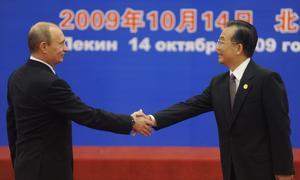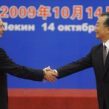
Russia and China Clinch Gas Supply Deal
Publication: Eurasia Daily Monitor Volume: 6 Issue: 198
By:

Moscow and Beijing claim that their long-awaited gas supply deal is proof of what they describe as their bilateral strategic partnership, but the Russian and Chinese state-controlled energy giants apparently remain divided on the sensitive issue of gas prices. On October 13, the Russian gas giant Gazprom and China National Petroleum Corp (CNPC) signed a framework agreement on gas supplies, including the construction of a gas pipeline. It reportedly did not involve any “gas for loans” schemes used in the agreement between Russia’s state-run oil company Rosneft and CNPC concluded in April (Interfax, RIA-Novosti, ITAR-TASS, October 13).
The announcement was yet another twist in the long running saga of Russian gas maneuverings. In March 2006, in his previous capacity as president, Vladimir Putin promised to export up to 40 billion cubic meters (bcm) of Russian gas to China via a 6,700-kilometer $10 billion Altai pipeline. Also in March 2006, Gazprom and CNPC signed a memorandum of understanding (MOU) on the delivery of Russian natural gas to China from 2011, as a follow-up to the partnership deal signed in October 2004. Subsequently, in the past three years both sides have struggled to turn the MOU into a viable and binding contract. Gazprom reportedly offered to supply gas at European prices, while CNPC insisted on significantly lower gas prices.
However, earlier this month the Russian Prime Minister Vladimir Putin traveled to Beijing to witness the inking of the framework agreement between Gazprom and CNPC. On October 14, Putin said both sides, Gazprom and CNPC, agreed that gas prices would be connected with what he described as an “Asian oil basket.” He argued that Russia would have no trouble in supplying gas to China as its East Siberian gas reserves exceed 65 trillion cubic meters. Putin also said that Russia could consider Chinese payments for gas in rubles (Interfax, RIA-Novosti, ITAR-TASS, October 14).
Moscow’s pledges to accept payments for natural gas supplies in its own currency came as a continuation of the Kremlin’s repeated efforts to prop up the ruble at the expense of the U.S. dollar. Russian officials have repeatedly suggested an increased reliance on the national currency. In June, President Dmitry Medvedev advocated using national currencies in bilateral transactions, notably in energy trade with China. In October 2008, Putin at a meeting in Moscow with his Chinese counterpart Wen Jiabao urged the use of the Russian and Chinese currencies in bilateral trade in order to gradually replace transactions in U.S. dollars.
Putin’s statement that Gazprom accepted gas export prices connected with the “Asian oil basket” may be viewed as an indication that Moscow is prepared to supply gas to China at lower prices than its European exports. However, Russian officials also made clear that any final agreement on gas prices remains some time away. The Deputy Prime Minister Igor Sechin said that gas export prices are due to be agreed in early 2010 and a final contract could be signed next June. Actual gas supplies might start in 2014-2015, he said (Interfax, RIA-Novosti, October 13). In other words, despite the optimism contained in official pronouncements, Russia and China only managed to clinch yet another “preliminary” agreement on October 13, while a “real deal” still requires at least several months of further talks.
During its earlier negotiations, Gazprom reportedly offered to export gas to China at formula prices based on international oil prices, while China was understood to remain reluctant to accept that offer. Subsequently, Russian gas executives conceded that the gas deal remained elusive. On October 12, Gazprom Deputy CEO Alexander Ananenkov said Gazprom and Chinese negotiators were yet to agree on prices of Russian gas supplies to China. He also claimed that actual gas supplies could start in three years following a final bilateral agreement on gas prices (Interfax, October 12).
Meanwhile, Russian gas executives also appeared reluctant to commit any particular project or deposit to supply gas to China. The agreement between Gazprom and CNPC stipulates that Russia would supply gas from its gas network, and not from any particular deposit, Gazprom CEO Alexei Miller noted. Gas export prices would be calculated according to a formula based on the oil basket, he further explained (Interfax, RIA-Novosti, ITAR-TASS, October 14).
During talks in Beijing with his Chinese counterpart Wen Jiabao on October 13, Putin hailed the bilateral “strategic partnership” and economic cooperation. However, he conceded that trade between Russia and China was down this year, affected by the global economic crisis (Interfax, RIA-Novosti, October 13). During a meeting in Moscow in October 2008, Putin urged Wen Jiabao to raise bilateral trade up to $80 billion annually. Since then, however, bilateral trade has declined. Although Russia has refrained from disclosing the statistics on its trade with China, in 2009 bilateral trade is expected to fall to around $30 billion from $56.8 billion in 2008.
Therefore, despite optimistic official pronouncements, including pledges of bilateral energy cooperation, actual large-scale deals between Russia and China are once again proving painfully slow to materialize.




